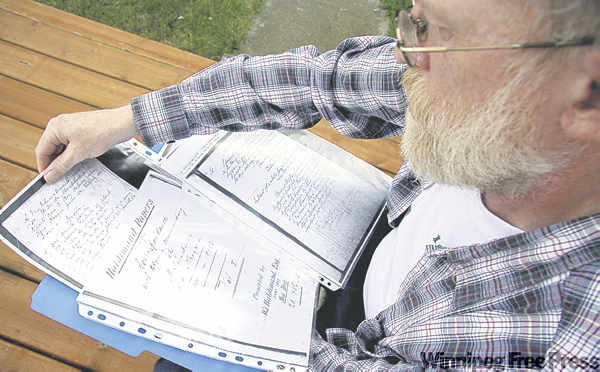First Nations sue for aboriginal rights
Government claims Manitoba Dakota refugees from U.S.
Advertisement
Read this article for free:
or
Already have an account? Log in here »
To continue reading, please subscribe:
Monthly Digital Subscription
$0 for the first 4 weeks*
- Enjoy unlimited reading on winnipegfreepress.com
- Read the E-Edition, our digital replica newspaper
- Access News Break, our award-winning app
- Play interactive puzzles
*No charge for 4 weeks then price increases to the regular rate of $19.00 plus GST every four weeks. Offer available to new and qualified returning subscribers only. Cancel any time.
Monthly Digital Subscription
$4.75/week*
- Enjoy unlimited reading on winnipegfreepress.com
- Read the E-Edition, our digital replica newspaper
- Access News Break, our award-winning app
- Play interactive puzzles
*Billed as $19 plus GST every four weeks. Cancel any time.
To continue reading, please subscribe:
Add Free Press access to your Brandon Sun subscription for only an additional
$1 for the first 4 weeks*
*Your next subscription payment will increase by $1.00 and you will be charged $16.99 plus GST for four weeks. After four weeks, your payment will increase to $23.99 plus GST every four weeks.
Read unlimited articles for free today:
or
Already have an account? Log in here »
Hey there, time traveller!
This article was published 25/07/2009 (5942 days ago), so information in it may no longer be current.
BRANDON –Armed with newly discovered archival documents from the 18th century, three Dakota First Nations bands in Manitoba filed a comprehensive claim against the Canadian government Friday to prove they were never refugees.
The claim alleges that Canada misrepresented the Dakota people as "American refugees" in the 1870s, a label they believe was used to deny them aboriginal rights, land compensation, funding and recognition as Canadian aboriginal people under the Charter of Rights and Freedoms.
"Historically, unlike other First Nations that entered into treaties — which involve surrender provisions — the Dakota have never entered into any such treaty," the Dakotas’ attorney Bruce Slusar said.

"Their relationship with the British Crown was one of peace, friendship, economic affiliation or trade and military support. They have never surrendered any interest in their lands or territory."
Slusar filed the claim in Saskatoon federal court late Friday afternoon on behalf of Canupawakpa Dakota Chief Frank Brown, Sioux Valley Chief Donna Elk, and Dakota Plains Chief Orville Smoke.
For nearly 140 years, successive Canadian governments have classified the Dakota people — the largest division of the Sioux nation — as refugees who fled the United States cavalry into Canada following the Minnesota Sioux War of 1862 and the battle of the Little Big Horn in 1876.
The court claim comes two years after the Canadian government offered a $67-million settlement to the nine Dakota and the Lakota bands of Saskatchewan and Manitoba — all of them non-treaty bands. The other six bands are not involved in the new claim.
The offer, which was ultimately rejected, reconfirmed Canada’s position that the Dakota do not have aboriginal rights in Canada. It required comprehensive waivers from each Dakota/Lakota First Nation that would release Canada from any future claims by the bands for aboriginal treaty rights, future land claims, or any new hunting, trapping or fishing rights.
"We’re tired of this refugee stuff that’s put upon us," Chief Brown said earlier this week. "We have evidence to prove that we are from here, and to prove that we are not refugees. These documents show that we are in our own rightful territory."
Brown was referring to several letters and sketches discovered by Manitoba historian James Ritchie, who works for the Dakota bands.
Ritchie, who is considered an expert on aboriginal oral history by UNESCO, says the documents date from between 1760 and 1860, predating Canada’s Confederation.
The historian looked for an eyewitness in every decade between 1760 and 1860 who was in Northwestern Ontario, southern Manitoba or southern Saskatchewan and who met Dakota people.
"We did find at least one example from each decade," Ritchie said. "Some of them are British officers writing reports saying I met with chief so and so. One of them is simply the teenage son of an employee of Lord Selkirk who does a portrait painting of one of the Dakota chiefs. But he puts his name on it, and identifies that he painted it at the Red River.
"And this is at least 100 years before Canada acquired the territory."
In his search, Ritchie also came upon an internal government report that was never made public, which calls into question the validity of treaty documents made by Canada with several of the country’s First Nations.
"The individuals in control of the documents, the translators, superintendents, and secretaries, many of them — possibly all of them — are involved in criminal fraud," Ritchie said.
"We have the government of Canada’s own conclusion from the time, that they were involved in criminal fraud. That part of the argument is not putting forward the Dakota case, it’s attacking the Canadian case."
Dakota Plains Chief Orville Smoke says the federal claim may ultimately force Canada back to the negotiating table with a proposal that makes sense.
"It’s a means of keeping the door open."
The federal government now has 30 days to respond to the claim, Slusar said.
— Brandon Sun


